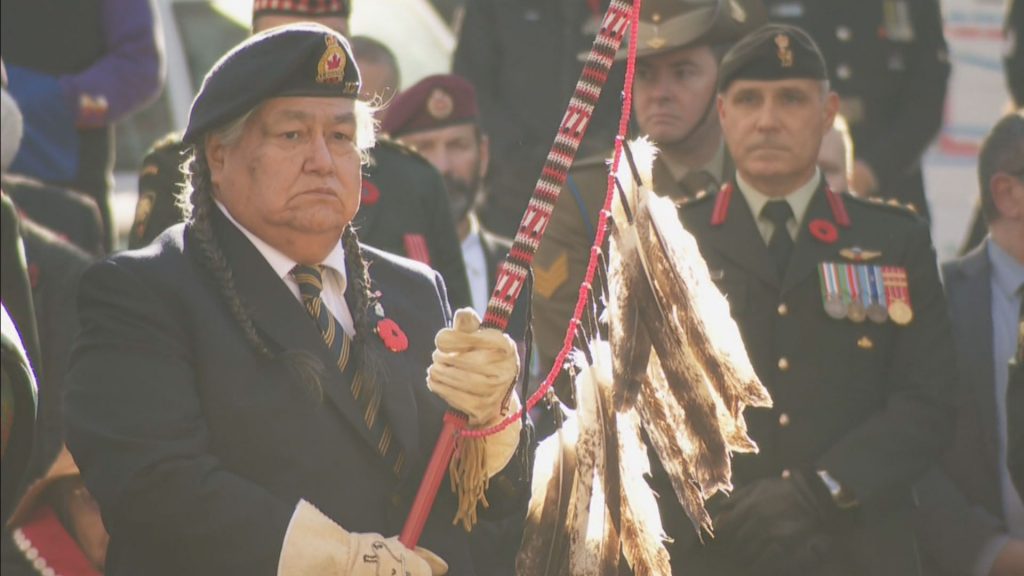
Across the country, family, friends and politicians gathered at ceremonies to mark national Indigenous Veterans Day.
More than 7,000 Indigenous people have served in the Canadian military since the First World War.
The Mi’kmaw Native Friendship Centre in Halifax hosted a ceremony to mark the day.
About 100 people gathered to remember those who served and sacrificed.
Elder Debbie Eisan was in the military for 36 years.
She said Indigenous veterans are honoured at every gathering on Nov. 8 because, “back in history when Indigenous veterans were not allowed to lay wreaths at the November 11th ceremony, so we have our ceremonies in our communities to honour our Indigenous veterans,” she said.
The service included Mi’kmaw songs and John McCrae’s famous poem, In Flanders Fields, read in Mi’kmaw.
Watch Angel Moore’s story from the friendship centre
Poor turnout in Ottawa
A single guitarist was about all Ottawa could muster to mark the day.
Kevin Schofield arrived to honour his grandparent who was in the military.
He didn’t mince words about the turnout.
“Ottawa’s a fickle place. It’s kind of dismissive and into their own little world. And they say they’re supportive of rights, this and that, and supporting of differing voices but we find that any voices regarding Indigenous humanity or Indigenous rights or Indigenous freedoms is ignored,” he said.
David Eaglestick is a sailor in the Canadian Navy. He was surprised more people didn’t turn out.
“I thought it was going to be big. And I got here and there was only three poppies laid and I placed the third one,” he said.
Fraser Needham was at the Indigenous war memorial in Ottawa
Veterans gather in Winnipeg
A simple wreath-laying ceremony took place in Winnipeg at the Minto Armoury, home to the Royal Winnipeg Rifles.
Inside the historic building, a grand entry was followed by a moment of silence and stories from Indigenous veterans – including the reality that many face in Canadian society.
“The veterans and the way our people are treated by society has to be noted,” said veteran Melvin Swann. “It’s not going away and it’s ironic that Tommy Prince died on the street. I myself have seen a lot of discrimination. It’s hard to accept. Days like this is the time where who we are in this country comes out.”
There was also a wreath-laying ceremony accompanied by the Royal Winnipeg Rifles drum group.
Veterans’ society says it needs more federal dollars to operate
In Edmonton, the Aboriginal Veterans Society of Alberta is doing what it can to help their members get the benefits they’re entitled to.
The society has been around since 1962 – and as a non-profit organization since 19992.
Charles Isaacs, president of the society, says about eight volunteers keep the organization running.
He says the society hasn’t received any federal dollars in five years.
“We need capacity funding to train some staff to be able to go out to the rural areas and visit the veterans, and make sure that the benefits they are receiving are actually the benefits they are actually entitled to,” he says. “Because, if people don’t know, there’s no way they have access to the program.”
He said Indigenous soldiers have long played a key role in Canada’s wars and deserve the benefits from that.
Watch Chris Stewart’s story here:
More than 500 people took in the annual National Indigenous Veterans Day ceremony in Vancouver.
Honoured veterans, Indigenous and political leaders spoke at the event.
This year Assembly of First Nations National Chief RoseAnne Archibald and N.W.T. Regional Chief Gerald Antoine attended the event for the first time.
Tina House caught up with them at the event.
Tina’s story here:









